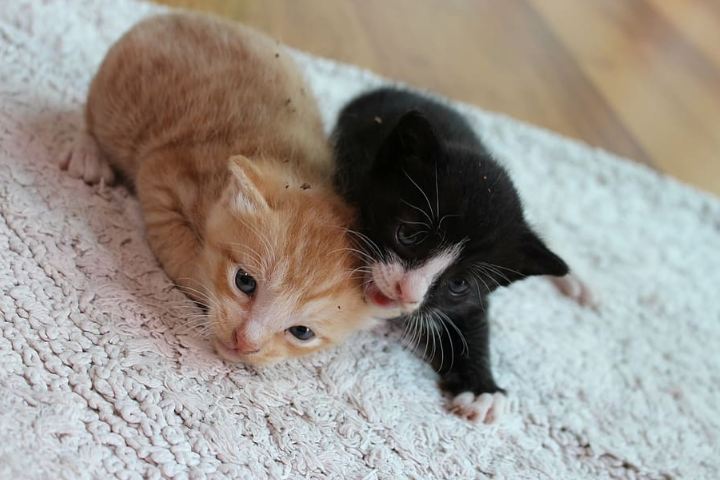Raising a new kitten, like raising any pet, is an experience loaded with challenges and rewards. If you’re considering getting a new kitten, you’ll have a little bundle of joy to watch and years to enjoy his growth. It’s a pretty exciting decision, but there’s a lot to consider. Taking care of a baby pet means additional responsibilities and potential challenges.
When adopting an adult cat, there is usually very little guesswork. An adult cat has fully-grown fur and does not have the impulse to chew on everything. Though he may still like to play, an older cat is pretty much chill most of the time. But adopting a kitten often comes with more work. His habits haven’t been set yet, and you get to teach him and watch him grow. Here are tips and what to expect when adopting a kitten:
Make sure to get an overview of where you can adopt or buy a kitten.
If this will be your first kitten or new to the neighborhood, you might wonder where you can find your pet. You can get a cat from shelters, rescue groups, pet stores, breeders, and even on the Internet. Here’s what you need to know about these places:
- Shelters and rescue groups – This is a great place to rescue an adult cat. If you’re in luck, maybe you’ll find newborn kittens from there, but it’s not as likely. Most of them have workers or volunteers who provide foster care for cats until they can permanently be placed. They will interview you to make sure you can provide a great home for the pet.
- Breeders – If you want a purebred kitty, find breeders in the national cat magazines, and look for some on the Internet. Like good shelters, breeders will interview you and ask you to sign a contract.
- Internet – Using petfinder.org or cyber shelters available from the American Society of the Prevention of Cruelty to Animals (ASPCA), you may find the right cat for you. These sites post photos of cats and kittens available for adoption. The website makes it easy for you to check out adoptable cats in your area and choose their breed, gender, coat length, color, and more.
- Pet stores – Pet store animals are often obtained through kitten mills, and they care only about making money rather than the well-being of the animals. However, some forward-thinking pet stores have their own.
- Friends or relatives – If you have friends or relatives who have a cat that gave birth to a litter of kittens, you can adopt a couple of them. It will not only give you a new pet, but it will also allow you to help out a friend or relative.
- Strays – There are many free-roaming cats in the world, and they might come to you instead of the other way around. These kittens will be grateful for being brought indoors.
When looking where to adopt, be smart. Be on the lookout for kitten mills and online scams that only want your money.
Do not adopt too early.
Kittens adopted too young tend to bite and claw more than those corrected by mom and their siblings. They might also be fearful or less tolerant of other cats because they have not been exposed to proper feline etiquette. As much as possible, newborn cats must stay with their mom and siblings for at least 12 to 16 weeks. If in case it’s not possible because the kitten has been separated early with its family, this means you have to be the cat mom who will teach the baby cat how to claw, potty, and other manners.
When adopting kittens, it’s best to adopt two instead of one, so they can teach each other their bite limits and target one another in play, instead of your toe or ankles. If you work full time, having two kittens will give them built-in buddies while you’re away. Kittens are also asleep much of the day, so having a playmate will ease your job as a fur parent because it means less playtime with them during the night when you really want to sleep.
Treat your kitten as a baby pet.
Like puppies and human infants, kittens’ needs vary from those of their grown-up kind. A kitten will have more care requirements than a fully mature cat. Here are some tips on taking care of kittens at specific development stages:
Under eight weeks of age: Kittens two months and below should still be with their mom and littermates. This is because kittens this age are still unable to regulate their own temperatures, and they rely on one another’s body heat to survive. Also, their vision and leg coordination are still developing at this point. If you adopt or buy a kitten at this age, special care needs to be taken, like bottle feeding them every two hours until they reach four weeks of age, and you might also need to help your kitten pee and poop. It’s best to consult with a vet for specific instructions and advice.
- Eight to eleven weeks of age: Kittens must be eating the kitten diet at this stage, whether it’s dry kibble or wet food specifically formulated for kittens. The cat food for kittens is specially formulated to be energy-dense, rich in protein, and easily digestible by young ones. It’s also the time when kittens love to run, jump around, play, and explore their surroundings, so you have to supervise them from time to time to ensure they won’t get hurt or damage your stuff.
- Two to four months of age: This is a phase when kittens grow rapidly and have thrice more energy than an adult cat. During this time, they need three to four individual meals a day.
- Four to six months of age: This is the time when kittens are reaching adolescence and sexual maturity. It’s the time to bring your kitten to a vet to have them spayed or neutered to prevent unpleasant habits like accidental litters and territorial spraying.
Prepare your home for the kitten.
Make some preparations before bringing your new kitten home. The first thing to do is to kitten-proof the house. Look at each room from a kitten level. Move your power cords, electronics, window blind cords, and any other strings that they might reach. Close off windows, vents, and any nooks and crannies that the kitten might be tempted to explore. Remove the objects that may pose a choking hazard.
It’s best to set aside a specific area for your kitty so she can get used to her new surroundings. This area must be off-limits to other pets, and young kids can only go there when supervised. Provide these important supplies for your kitten’s base camp:
- Litter box
- Cat bedding
- Food and water dishes
- Cat barrier
- Scratching post and kitten-safe toys
Also, make sure you have a stock of kitten food, cat treats, cat brush, toothbrush, collar, and ID tags. The cat barrier or pet gate can help keep the kitten safe and keep out other pets. Your kittens must only be allowed to have contact with your other pets if they have been vaccinated, and when they appear accepting of one another’s presence with no signs of aggression.
Know how and what to feed a kitten at a certain age.
Ideally, kittens must stay with their mother and littermates until they are eight weeks old to be weaned by their mom. But if you happen to adopt an infant kitten, then you must bottle feed them every two hours. In situations like this, consult your vet about proper diet and feeding schedule for your little one.
If the adopted kitten has been weaned into solid food, ask the prior guardian about the food she’s been eating. You may decide to keep feeding her the same food, but if you want to change it, mix a small amount of new food to the old food and gradually increase the amount of the new food over the course of a week to prevent digestive problems.
You also need to adjust the kitty’s feeding schedule by age.
- Up to six months – At this stage, kittens must be fed three to four times a day, since they are growing rapidly at this age.
- Six to nine months – When your kitten reaches adolescence, growth slows, and the kitten doesn’t need to be fed more than twice a day.
- Nine to twelve months – By one year, your cat is no longer a kitten. The transition to adulthood starts at nine months, so you can also start transitioning her to adult cat food gradually.
Be willing to train and socialize them.
Training kittens to use the litter box must be one of your priorities on the kitten’s first day at home. Usually, the kitten instinctively knows what to do, but they need to know where the box is. Remind where the box is from time to time by using positive reinforcement. It may also help to have a couple of litter boxes around the house just to make sure your kitty has easy access to one.
Besides potty training, you must also establish household rules and reinforce boundaries with your kitten. Again, you have to use positive reinforcement and avoid hitting her, punishing her, and speaking to her harshly. Reward good behavior by giving her treats. If they are scratching things, you don’t want to be scratched, hand her a toy to play, or redirect her to a scratching post instead. If it doesn’t work, give her a time out and put her to her base camp until she calms down.
While your cat is still a kitten, she must be played with and comforted frequently. Expose her to new sounds, sights, smells, and sensations. You can put her in a pet carrier, let her ride in a car, and wear a collar. It’s also the time when your kitten must tolerate grooming tasks like nail trimming, bathing, brushing, and tooth brushing. Give her objects to explore, introduce her to new toys, and expose her to other cats and kittens.
See a vet ASAP.
Your new kitten must be taken for a health check after a week of having her home. On her first visit to the vet, have your pet checked for parasites, fleas, and heartworm. Ask which vaccinations your kittens need and how often they must be taken. Vaccines for preventative care include rabies, feline leukemia, and distemper. Early diagnosis improves the chances of recovering quickly, ensuring healthy adulthood for your cat.

